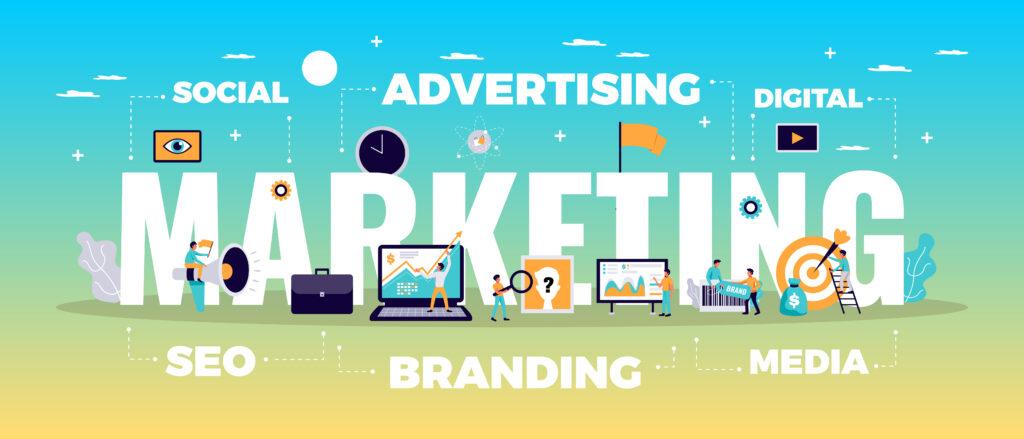Digital marketing has revolutionized the way businesses connect with consumers. In today’s digital age, where technology has become an integral part of our lives, understanding how digital marketing affects consumer behavior has become crucial for businesses to thrive. This article aims to delve into the various aspects of digital marketing and its profound impact on consumer behavior. From the definition and evolution of digital marketing to exploring the role of social media, search engine optimization, email marketing, personalization, and customization, we will examine how these strategies shape consumer decision-making processes. Additionally, we will address the ethical considerations that arise in the digital marketing realm. By understanding the relationship between digital marketing and consumer behavior, businesses can craft effective marketing strategies to engage and influence their target audience.
Table of Contents
Introduction to Digital Marketing

Definition of Digital Marketing
Digital marketing is the art and science of promoting products and services using digital platforms such as websites, search engines, social media, email, and mobile apps. It’s all about leveraging technology to reach and engage with target audiences, build brand awareness, drive website traffic, and ultimately, generate sales.
Evolution and Importance of Digital Marketing
Gone are the days when businesses relied solely on print ads, TV commercials, and billboards to get their message across. With the rise of the internet and the increasing number of people going digital, traditional marketing strategies are no longer as effective. Enter digital marketing, a game-changer that allows businesses to connect with potential customers in a more targeted and cost-effective way.
Digital marketing has become an essential part of any business’s marketing strategy. It helps level the playing field for small businesses, enables global reach, and provides measurable results. Plus, with more and more people spending their time online, it’s crucial for businesses to have a strong digital presence to stay competitive.
Understanding Consumer Behavior in the Digital Age
Overview of Consumer Behavior
Consumer behavior refers to the study of individuals or groups and their actions when purchasing and using products or services. It encompasses various factors such as motivations, perceptions, attitudes, and decision-making processes.
Key Factors Influencing Consumer Behavior
In the digital age, consumer behavior has evolved significantly. Factors like convenience, price, brand reputation, and social influence continue to play a role, but technology has introduced new elements. These include online reviews, social media recommendations, personalized advertisements, and the ability to compare products and prices instantaneously.
The Impact of Digital Marketing on Consumer Decision-Making Process

Traditional vs. Digital Consumer Decision-Making Process
The traditional consumer decision-making process involved a linear progression from awareness to consideration, evaluation, purchase, and post-purchase evaluation. However, in the digital era, this process has become more dynamic and interactive.
How Digital Marketing Influences Awareness and Interest
Digital marketing plays a crucial role in creating awareness and generating interest among consumers. Through targeted advertisements, engaging content, and search engine optimization, businesses can effectively reach their target audience and capture their attention.
Digital Marketing’s Role in Evaluation and Purchase
Digital marketing provides consumers with the tools and information necessary to evaluate products and make informed purchase decisions. Online reviews, comparison sites, and social media recommendations give consumers insights into the quality and value of products, making the evaluation process more transparent and efficient.
Post-Purchase Behavior and Digital Marketing
Digital marketing doesn’t stop at the point of purchase. It continues to influence post-purchase behavior, such as providing after-sales support, personalized offers, and encouraging reviews and referrals. This ongoing engagement helps businesses build customer loyalty and drive repeat purchases.
The Role of Social Media in Influencing Consumer Behavior
Social Media’s Influence on Brand Perception
Social media platforms have become powerful tools for shaping brand perception. Through social media, consumers can share their experiences, opinions, and recommendations, which can significantly impact how others perceive a brand. Businesses must actively monitor and engage with social media conversations to maintain a positive brand image.
Social Media Engagement and Consumer Trust

Social media also plays a vital role in building consumer trust. By engaging with customers, responding to inquiries, and providing valuable content, businesses can establish credibility and foster trust among their target audience. This trust translates into increased brand loyalty and advocacy.
Harnessing Social Media for Word-of-Mouth Marketing
Social media has revolutionized word-of-mouth marketing. Consumers now have a platform to share their positive experiences, recommendations, and endorsements with a broader audience. Businesses can leverage this by encouraging user-generated content, implementing influencer marketing, and fostering online communities that promote their brand.
In conclusion, digital marketing has a significant impact on consumer behavior in the digital age. It influences the entire consumer decision-making process, from creating awareness and generating interest to evaluation, purchase, and post-purchase behavior. Additionally, social media plays a crucial role in shaping brand perception, building consumer trust, and facilitating word-of-mouth marketing. As technology continues to advance, the influence of digital marketing on consumer behavior will only continue to grow. So, buckle up and embrace the digital revolution! and Trust in Ethical Marketing Practices.
Search Engine Optimization and Consumer Behavior

Understanding the Impact of SEO on Consumer Behavior
Search Engine Optimization (SEO) plays a significant role in shaping consumer behavior in today’s digital landscape. When consumers search for products or services online, they often rely on search engines like Google to find what they need. By optimizing their websites and content for search engines, businesses can improve their visibility and attract more potential customers.
The impact of SEO on consumer behavior is twofold. First, it influences the information consumers receive during their search. SEO ensures that the most relevant and authoritative websites appear at the top of search results, which directly influences which sites consumers visit and trust.
Second, SEO affects the consumer’s overall online experience. Websites that are optimized for search engines tend to load faster, provide a better user experience, and offer the information consumers are looking for. This positive experience can influence consumer behavior by increasing the likelihood of engagement, conversion, and repeat visits.
Optimizing User Experience and Conversion Rates
One of the key objectives of SEO is to optimize user experience and conversion rates. When consumers visit a website, they expect it to be user-friendly, easy to navigate, and relevant to their needs. SEO techniques such as improving website structure, optimizing page loading speed, and enhancing mobile responsiveness can all contribute to a positive user experience.
A seamless user experience increases the chances of conversion, whether it’s making a purchase, filling out a form, or subscribing to a newsletter. By aligning SEO strategies with user experience optimization, businesses can not only attract more visitors but also increase the likelihood of converting those visitors into customers.
The Role of Keywords and Consumer Intent
Keywords are a crucial component of SEO and play a significant role in understanding consumer intent. When consumers search for something online, they use specific keywords to find relevant information. By conducting keyword research and incorporating these keywords strategically into their content, businesses can align their offerings with consumer intent and attract highly targeted traffic.
Understanding consumer intent helps businesses tailor their messaging and offerings to meet customer needs effectively. By analyzing keyword data and consumer search patterns, businesses can gain insights into what their target audience is looking for, allowing them to create more relevant and compelling content. This alignment between keywords, consumer intent, and content can significantly impact consumer behavior by increasing engagement, trust, and ultimately, conversions.
Email Marketing and Consumer Behavior

Building Consumer Relationships through Email Marketing
Email marketing remains a powerful tool for influencing consumer behavior. By building and nurturing relationships with customers through personalized and relevant email campaigns, businesses can strengthen brand loyalty and encourage repeat purchases.
Email marketing allows businesses to connect with consumers directly in their inbox, creating a more personal and intimate communication channel. Through engaging and valuable content, businesses can build trust, educate consumers about new products or services, and provide exclusive offers that cater to their interests and needs.
Personalization and Segmentation in Email Campaigns
Personalization and segmentation are key factors in the success of email marketing campaigns. By leveraging consumer data, businesses can segment their email lists based on demographics, preferences, and purchase history. This segmentation allows for the delivery of highly targeted and personalized content that resonates with each customer individually.
Personalized emails that address the recipient by name and offer tailored recommendations or promotions have a higher chance of capturing attention and driving action. By delivering relevant content to the right audience, businesses can influence consumer behavior by fostering a sense of exclusivity and personal connection.
Email Marketing Metrics and Consumer Response
Measuring the effectiveness of email marketing campaigns is essential in understanding consumer behavior and optimizing future strategies. Metrics such as open rate, click-through rate, and conversion rate provide insights into how consumers are responding to email content.
Analyzing these metrics allows businesses to assess the impact of their email marketing efforts and make data-driven decisions. By understanding which types of emails resonate with consumers and drive the desired actions, businesses can refine their email marketing strategies to have a more significant impact on consumer behavior.
Personalization and Customization in Digital Marketing Strategies
The Power of Personalization in Consumer Engagement
Personalization is a powerful tactic in digital marketing that can significantly impact consumer engagement. By tailoring marketing messages and experiences to individual consumers, businesses can create a more meaningful and relevant interaction that captures attention and drives action.
Consumers appreciate personalized experiences that make them feel seen and understood. Whether it’s personalized product recommendations, customized landing pages, or targeted advertisements, personalization enhances the overall consumer experience and influences behavior. Businesses that invest in personalization can build stronger relationships with consumers, leading to increased loyalty and advocacy.
Strategies for Customizing Digital Marketing Content
Customizing digital marketing content involves understanding consumer preferences, behavior, and demographics to tailor messaging and experiences accordingly. Businesses can leverage data and analytics to gather insights about their target audience and create relevant and engaging content.
Segmentation is a valuable strategy in customization, allowing businesses to divide their audience into groups based on specific characteristics or behaviors. By creating content that resonates with each segment, businesses can deliver a more personalized experience that grabs attention and drives desired actions.
Balancing Personalization with Privacy Concerns
While personalization is effective, it’s crucial to balance it with privacy concerns. Consumers are increasingly aware of data privacy and expect businesses to handle their information responsibly. Respecting consumer privacy and obtaining proper consent for data usage is essential in maintaining trust and credibility.
Businesses should be transparent about their data collection practices and allow consumers to control their preferences. By striking the right balance between personalization and privacy, businesses can create customized experiences that respect consumer boundaries and foster a positive brand image.

Ethical Considerations in Digital Marketing and Consumer Behavior
Understanding Ethical Issues in Digital Marketing
igital marketing brings ethical considerations into play. Businesses must be mindful of how their marketing efforts impact consumers and society as a whole. Ethical issues in digital marketing include misleading advertising, intrusive targeting, and the use of consumer data without consent.
Understanding and addressing these ethical concerns is crucial for businesses to maintain a positive reputation and build trust with consumers. By operating ethically and transparently, businesses can influence consumer behavior positively and establish themselves as responsible and trustworthy brands.
Consumer Perception and Trust in Ethical Marketing Practices
onsumer perception and trust are closely linked to ethical marketing practices. When consumers perceive a brand as ethical and responsible, it creates a positive association that can influence their behavior and purchasing decisions. On the other hand, unethical practices can tarnish a brand’s reputation and deter consumers from engaging with the business.
Being transparent about marketing strategies, respecting consumer privacy, and delivering on promises are essential elements in building trust. By prioritizing ethical marketing practices, businesses can foster positive consumer perception, which can lead to increased loyalty and advocacy.
FAQs

01. How does digital marketing impact consumer behavior?
Digital marketing has a significant impact on consumer behavior by influencing their awareness, interest, evaluation, and purchase decisions. It allows businesses to target specific audiences, personalize messages, and engage consumers through various digital channels like social media, email marketing, and search engine optimization.
02. Can social media really influence consumer behavior?
Yes, social media plays a crucial role in influencing consumer behavior. It helps shape brand perception, build trust through user-generated content and testimonials, and facilitate word-of-mouth recommendations. Social media platforms provide businesses with an opportunity to engage with consumers directly, driving awareness, consideration, and purchase intent.
03. Is personalization in digital marketing effective for influencing consumers?
Personalization in digital marketing is highly effective for influencing consumers. By tailoring content, recommendations, and offers based on individual preferences, businesses can create a more personalized and relevant experience for consumers. Personalization helps to foster a deeper connection, increase engagement, and drive conversion rates.
04. What ethical considerations should businesses keep in mind when implementing digital marketing strategies?
Businesses should prioritize ethical considerations in digital marketing to build trust and maintain customer loyalty. Respecting consumer privacy, obtaining proper consent for data usage, and being transparent in data collection and targeting practices are key ethical considerations. Balancing personalization with consumer privacy concerns and avoiding misleading or manipulative tactics are also important for ethical digital marketing.









